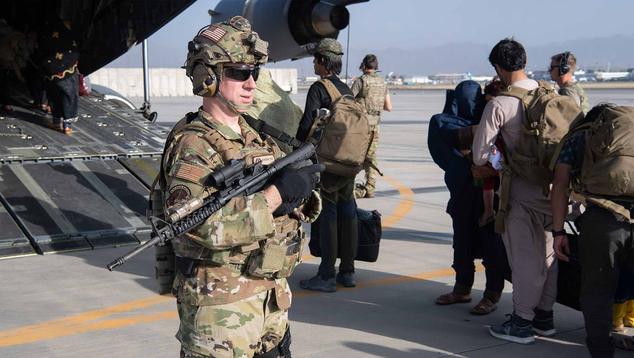Public opinion relating to the U.S. and Afghanistan can be divided into four categories: (1) Americans' basic assessments of the 20-year U.S. military involvement in Afghanistan, (2) Americans' views of the decision to completely withdraw U.S. troops at this point, (3) Americans' views of the way in which the withdrawal was handled and (4) the longer-term political impact.
U.S. Involvement
Retrospective approval of U.S. involvement in Afghanistan is at or below the majority level and appears to be getting more negative as time goes on. Americans at this point have significant doubts about the country's 20-year military involvement in Afghanistan -- the longest war in U.S. history, estimated to have cost over $2 trillion and almost 200,000 total deaths.
Gallup's July 6-21 update of a trend question asking if the U.S. made a mistake sending military troops to Afghanistan found 47% saying yes and 46% saying no. This "mistake" percentage is as high as at any time since just after troops were first sent to Afghanistan in November 2001, with the exception of one 49% reading in February 2014.
The most recent Gallup poll was completed prior to much of the news coverage of the speed with which the Taliban regained control of Afghanistan. More recent polling (but conducted before the massive Aug. 26 explosion that killed U.S. service members and many civilians) generally shows a majority negative assessment of U.S. involvement in Afghanistan. These include an NBC News poll conducted Aug. 14-17 showing that 61% of Americans say the Afghanistan War was not worth it -- "When it comes to Afghanistan, do you think the war was worth it or not worth it?" -- and an AP-NORC poll from Aug. 12-16 finding that 62% of Americans say the war in Afghanistan was not worth fighting.
The Decision to Withdraw U.S. Troops
President Joe Biden announced his decision on April 14 to withdraw all U.S. troops from Afghanistan. As we would expect given the underlying negative views of U.S. involvement in Afghanistan, surveys thereafter showed significant public support for Biden's decision. An Ipsos survey conducted April 16-18 found 50% supported the idea of the U.S. bringing home "all of its troops from Afghanistan immediately," while 27% opposed. The 2021 Chicago Council Survey, conducted July 7-26, found 70% support for the decision to withdraw U.S. troops from Afghanistan by Sept. 11. A Quinnipiac poll in May found 62% support. A Fox News poll conducted after the April announcement gave respondents two options -- removing all troops or leaving some U.S. troops in Afghanistan for counterterrorism operations -- and found 50% opted for the latter choice, while 37% said that all troops should be removed.
More recently, even as reports of the Taliban takeover began to dominate the news, Americans appeared to be sticking to their support for the U.S. getting out of Afghanistan. A CBS News poll from Aug. 18-20 found 63% approval of the U.S. removing troops from Afghanistan. A Morning Consult/Politico poll found somewhat more muted support in its Aug. 16-19 poll among registered voters, with 53% supporting and 36% opposing the decision. The wording of that poll -- "As you may know, United States President Joe Biden announced the start of a withdrawal of U.S. military presence in Afghanistan beginning May 1, with all troops returning home by Sept. 11, 2021. Based on what you know, do you support or oppose President Biden's decision?" -- explicitly mentioned Biden, which may help explain the lower level of support compared with the CBS News survey, which did not mention the president.
Several commentators have noted a particularly loaded wording in another question included in Morning Consult/Politico polling:
"Do you believe the U.S. should still withdraw its military presence in Afghanistan if it means it creates an opening for al Qaeda and other terrorist groups to establish operations in Afghanistan?"
Even with this "directed verdict question," 45% of Americans agreed that troops should be withdrawn, compared with 40% who said they should not. This is taken, I think correctly, as an indicator of the degree to which the public is behind the withdrawal. The Fox News poll from April, however, suggests there may have been at least some public support for a more limited withdrawal had Biden articulated that as an option.
Assessment of the Way the Withdrawal Has Been Handled
Given that the majority of Americans believe the time has come for the U.S. to get out of its military involvement in Afghanistan, I think it is fair to conclude that Biden has -- in concept -- been carrying out the broad will of the American public.
Support for the idea of U.S. disinvolvement in Afghanistan is, however, separate from views on how well such withdrawal has been conducted. Recent surveys show the majority of Americans believe the whole process has been handled poorly, and Biden himself receives low marks for his handling of the situation. In short, perceptions of the competence and execution of the actions in Afghanistan are much more negative than perceptions of the objective or intent of the actions.
Several recent polls support this conclusion. The NBC News poll shows 25% of Americans approve of the way Biden is handling the Afghanistan situation. The CBS News poll finds 74% say the removal of the troops has been handled badly by the U.S. and 67% say that Biden did not have a clear plan for evacuating American civilians. An Aug. 13-16 Morning Consult/Politico poll shows that 31% of registered voters approve of Biden's handling of Afghanistan, while 57% say (at the time of the poll) that the withdrawal is not going well. And the USA Today/Suffolk poll shows a 27% approval rating for Biden's handling of Afghanistan.
Long-Term Impact
The only really accurate way to assess the long-term impact of any specific event is to wait for the long term and see what happens. But this evident fact of life doesn't prevent us from looking at data-driven possibilities.
One of the most frequent focal points for consideration of the long-term impact of what we are witnessing in Afghanistan concerns Biden and the Democrats. The president's overall approval rating appears to be edging down, measured by Gallup's Aug. 2-17 poll at 49% -- by one percentage point, the lowest of his administration. And, as my colleague Jeff Jones noted, "Interviews conducted in the last three days of the poll's field period, after Kabul fell, showed slightly less positive ratings for Biden than those conducted earlier."
Other polls show similar declines, and one -- conducted Aug. 19-23 by Suffolk University for USA Today -- shows Biden's approval rating dropping all the way to 41%, which is either an outlier or a portent of further drops to come (no other poll has measured Biden's approval nearly that low).
But, as is usually the case, it is difficult to disentangle the exact causes for presidential approval movement. Recent data show there is much more on Americans' minds than Afghanistan, suggesting caution in ascribing changes in Biden's approval rating to any one factor. Gallup's Aug. 2-17 update, for example, shows that less than 1% of Americans mention the situation in Afghanistan as the most important problem facing the U.S. today, while COVID-19 has increased significantly as the perceived top problem, followed by mentions of the government, immigration and the economy. The NBC News poll similarly shows no significant mention of Afghanistan when respondents are asked to name the most important issue facing the country.
The images coming out of Kabul and elsewhere in Afghanistan bring back memories of the dramatic fall of Saigon at the end of April 1975, as the North Vietnamese surged south and took control of the city. Gerald Ford was president at that time, although the last combat troops had left Vietnam in the spring of 1973, with Richard Nixon in the White House.
A review of Gallup polling in 1975 finds little evidence that the takeover of the country and the dramatic evacuations from South Vietnam had a direct effect on Ford's approval rating. A Gallup retrospective published when Ford died in 2006 showed his previously anemic ratings appeared to have improved significantly in the weeks after the fall of Saigon, but this most likely reflected the United States' handling of the capture of the SS Mayaguez by Cambodian Khmer Rouge rebels. Americans' views of the most important problem facing the nation after April 1975 -- as is the case now -- show very little mention of any international issues. Most Americans' concerns in 1975 were focused on domestic issues, including rampant inflation and a poor economy. In short, the dramatic events taking place overseas in Vietnam in 1975, even if they should have been anticipated by American leaders, didn't seem to have had much of a direct impact on Americans' views of either the president or the most important problem facing the nation. (Gallup polling showed that by the late 1960s, a majority of Americans thought U.S. involvement in Vietnam had been a mistake.)
Bottom Line
Americans believe Biden did the right thing in withdrawing U.S. troops from Afghanistan. Americans are as likely to view the whole 20-year experience in that country as a mistake as to say it was not, while recent polling shows the majority say involvement there was not worth it. But the extremely rapid movement of the Taliban to wrest back control of the country has left Americans with the perception that the withdrawal has not been handled well. Biden is given low marks for his handling of the situation, although -- despite commentary to the contrary -- it is too early to know what the long-term impact will be for Biden or for Democratic performance in next year's midterm elections. It is always possible that the events taking place now could result in a counterintuitive rally effect of sorts.
At this point in history, Americans' concerns about Afghanistan are competing for attention with other issues, particularly COVID. It is possible that new events in Afghanistan in the weeks and months ahead could shift Americans' attention and result in different views of the situation along with changes in attitudes about the wisdom of the U.S. decision to withdraw all troops.




